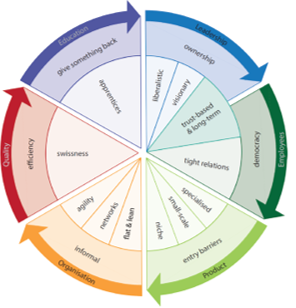
It is with great sadness, shock and disbelief that I have to report of the sad and sudden loss of Stephanie Looser, one of our Visiting Research Fellows, who passed away on 10 March. Our sympathy and support and empathy extends of course to her family, boyfriend and friends, who we hope will take heart that her contribution has been substantial and passionate. It is this academic contribution and the research gap that will be the focus of this blog, no matter how disconcertingly skinny, quirky and challenging she was. She has been an exceptional character and researcher, as all who knew her can attest.
It didn’t feel a long time ago, when this slightly unusual-looking person bounced into my office wanting to do a PhD. She, a colleague and I went for lunch and before we tucked into the habitual coffee, she had framed a far-reaching and yet do-able research agenda. It started with her observation that companies don’t ‘do CSR’ for the right reasons, and that simply distorted their impact, their concern for their social environments and their ability to ‘do the right thing for the right reason’. In the discussion, she impressed by her mental agility, brachiating effortlessly between Kant’s Categorical Imperative and what it means for today’s businesses, via the lack of Bentham’s view on utility in some modern Swiss businesses. She was casually accepting of national, sectoral, social and individual differences in what companies should do for Corporate Social Responsibility, and impressively dismissive in explaining how some sustainability commentators who saw too much congruence between profit maximisation and sustainability ‘just got it wrong’. My immediate thought was ‘this is going to be fun’. And it was.
Her passion for research, for the field and for communities has been exceptional. Her work rate has been phenomenal: by the time her confirmation viva took place, she had published 2 peer-reviewed papers and three conference papers; and she was writing her second book chapter. At the end of her doctorate, she added another dozen peer-reviewed papers (in English, French and German) an equal amount of conference papers, several book chapters and a number of op-eds in the academic press. She finished her degree 10 months early, and she was working at that time in Zurich as a busy administrator. All this was an unheard-of level of early-career achievement – a sign of passion, deep dedication, a very quick mind and a capacity to work more hours than most of us.
She started her intellectual contribution with a simple observation: some companies pursue CSR because they think it is ‘the right thing to do’, and others because it helps with the bottom line. But she took this observation far further by first establishing ‘intrinsic CSR’, observable in organisations who pursue CSR not as part of their pursuit of profit, competitiveness or material success, but out of a deeply-felt passion for the social communities that companies see themselves to be part of. She found that these companies do exist, typically as family-run businesses, or SMEs, or cooperatives, or ‘local’ companies with a long-established cultural tradition of being a social entity, first and foremost.

She also defined ‘extrinsic companies’ as those who pursue CSR for external reasons: Making profit, establishing a better brand, being closer to customers, supporting staff motivation and identity or regular reporting are here instruments towards the economic improvement of the organisation. She then showed that intrinsic CSR companies are often very innovative in technology and organisation, that they can be as competitive and successful in global markets as anybody, that we weirdly often overlook these companies as they don’t see the need for their advertising. She highlighted many national differences that exist in the prevalence, scope and scale of intrinsic companies (and where Swiss companies have a matching of economic success and intrinsic CSR – see the image) and what some of the differences are. In the Triple Bottom Line of economic, environmental and social performance, intrinsic companies tend to outperform extrinsic ones in the medium and long run.
In doing so, she bridged the gap between ethical principles and CSR, added a unique perspective to the dominant stakeholder theory and established that personal values of Chief Executives matter for organisational success in far more diverse ways than we have appreciated. I suggest, in acknowledgement of her lasting contribution that we call this the Looser Paradox: companies who do not pursue profit maximisation as the sole raison d’etre tend to perform better economically, socially and environmentally in the long run than others.
But such work rate and passion – she stated her reason to be a Research Fellow at CES as to work with all my motivation in trailblazing projects – also showed a very strong duality between her personal passion to support all and any in her social environment and the corporate engagement of intrinsic companies that she explored so vigorously. She cared for others more than she did for herself at times, and the disappointments she felt, from those in whom she placed her trust, hurt her badly. Yet the duality in her recommendation is also intriguing: pastoral care within meaningful, ethics-based Corporate Social Responsibility leads to greater results than instrumental pursuit of utility. Companies pursuing profit as sole sign of success tend to lose purpose, individuals seeking recognition above all tend to lose identity.
She passed away far too soon, much too young, with too many personal challenges and too many research questions still open. We owe it to ourselves, to each other and to this thing of Sustainable Development that we all keep wittering on about that we keep an eye out for each other! We all know students, colleagues, friends, neighbours, relatives who have a hard time at the moment and probably for too long. We owe it to her and her legacy that we pursue support and encouragement for all who come into our world, do not cast off anybody – no matter how weird-looking, skinny or compulsively creative they may be.
Walter Wehrmeyer
